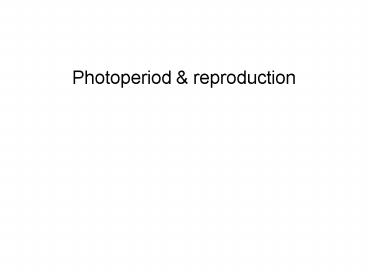Photoperiod - PowerPoint PPT Presentation
1 / 33
Title:
Photoperiod
Description:
... melatonin signal parameters investigated in pinealectomised hamsters ... Mediobasal Hypothalamus Lesion (hamster) Maywood and Hastings 1995. Open circle: MBH-X ... – PowerPoint PPT presentation
Number of Views:919
Avg rating:3.0/5.0
Title: Photoperiod
1
Photoperiod reproduction
2
Overview
- Seasonal changes in physiology
- The Photo-neuroendocrine System
- Melatonin biosynthesis
- Regulation by photoperiod
- Melatonin target tissues
- Hypothalamus, pituitary pars tuberalis
- Photorefractoriness and circannual rhythms
3
Seasonal Rhythms
- In the course of a year, daily rhythms of
behaviour follow fluctuations of daylength - Environmental changes at increasing latitude,
e.g. - Photoperiod
- Temperature
- Food availablitity
- Many species adapt physiology in anticipation of
these changes and to increase survival of their
offspring - Photoperiod is the most accurate environmental
indicator of seasonal time
Brandstätter and Ackerl, unpubl.
4
Seasonal Physiological Rhythms
- Photoperiodic regulation of seasonal physiology
in lab conditions
Brandstätter, unpubl. data
5
Seasonal Reproduction and Prolactin / Moulting
rhythms are synchronsed differently in diferent
mammals
Open circles Testis volume
Shaded area Mating season
Closed circles Plasma prolactin
6
Timing of Seasonal Reproduction
NB Timing of reproduction governed by length of
gestation
7
Circannual Rhythms
Testis Diameter (mm) Filled Circles
Plasma Testosterone (ng/ml) Open Circles
Almeida Lincoln 1984
- Occur in long-lived seasonal species (e.g. sheep)
- Occur in constant photoperiod (i.e. endogenous
control) - Equatorial species
- Melatonin target tissues?
- Photoperiod entrains circannual rhythms to annual
cycle
8
Seasonal Changes in Gonadotrophin Releasing
Hormone (GnRH) Secretion
9
The Photo-neuroendocrine System
- Pineal melatonin is a key hormonal clock output
- Melatonin is synthesised and secreted at night
- Rhythmic melatonin secretion is driven by a
poly-synaptic output pathway from the
suprachiasmatic nuclei (SCN) - Release of noradrenaline (NA) stimulates pineal
Moore 1996
10
The Photo-neuroendocrine System Pineal
Regulation by Photoperiod
Syrian hamster
Soay sheep
Maywood et al 1993
Hazlerigg et al 2004
11
Melatonin Biosynthesis
- Synthesised from tryptophan
- Key rate-limiting enzyme in melatonin
biosynthesis is arylalkylamine-N-acetyltransferase
(AA-NAT) - AA-NAT activity is stimulated by noradrenergic
stimulation of the pineal gland (output from the
SCN)
Arendt 1995
12
Species Differences in Mammalian AA-NAT Regulation
Coon et al 1995
Borjigin et al 1995
13
How does Changing Photoperiod Regulate Physiology?
- In mammals, Melatonin is essential for
photoperiodic time measurement - Removal of pineal blocks responses
- Melatonin infusion experiments have been done to
determine how changing melatonin secretion
controls reproductive activation
14
Timed Infusion Experiments in PinX Hamsters
4
saline, 16 h
MEL, 8 h
MEL, 16 h
2
Paired testis weight (g)
0
Alternate day/night
Nightly
15
Decoding the Melatonin Signal
- Importance of melatonin signal parameters
investigated in pinealectomised hamsters - Carefully controlled melatonin signals imposed by
timed injections/infusions - Key parameter is melatonin signal duration
- Long duration melatonin short day response
- Short duration melatonin long day response
16
Where how does melatonin act?
17
Receptor autoradiography
Helliwell and Williams 1992
Modified from Wittkowski et al 1992
18
Melatonin Receptors
- Major mammalian subtypes MT1 and MT2 (previously
Mel1a and Mel1b) - G-protein-coupled receptors
- MT1 receptors implicated in seasonal
neuroendocrinology - Strong expression
- Absence of functional MT2 in hamsters
- Melatonin receptors expressed in many
neuroendocrine tissues
Reppert 1997
19
Melatonin Target Sites in the Brain
- Most species express melatonin receptors in
multiple brain structures - Much inter-species variation
- Two major candidate sites for effects on
reproductive activation - 1 - Mediobasal hypothalamus (MBH)
- 2 - Pars tuberalis (PT)
20
The Case for the MBH
21
Mediobasal Hypothalamus Lesion (hamster)
Melatonin Infusion
Photoperiod Change
Open circle MBH-X Filled circle Sham control
Maywood and Hastings 1995
22
Mediobasal Hypothalamus Lesion (sheep)
Lincoln 2002
23
Summary of Mediobasal Hypothalamus Lesion Studies
- Attenuate effect of photoperiod (and melatonin
infusion) on reproductive status and body weight - No obvious effect on prolactin secretion
- Is prolactin regulated via a separate melatonin
target site (e.g. the PT)?
24
The Case for the PT
25
Receptor autoradiography
Helliwell and Williams 1992
Modified from Wittkowski et al 1992
26
?TSH is photoperiodically regulated in the sheep
PT
Hanon et al, 2008 Current Biology
27
Functional TSH-receptors in the sheep
neuroendocrine system
Hanon et al, 2008 Current Biology
28
Photoperiodic DIO2 regulation explains springtime
need for T4 in the sheep basal hypothalamus
Hanon et al, 2008 Current Biology
29
?TSH and DIO2 are both induced in first 10 days
following transfer to Long Days
Hanon et al, 2008 Current Biology
30
TSH rapidly induces DIO2 expression in sheep
hypothalamus
ME / PT primary culture, 3-h
Icv Infusion to SP sheep, 5-days
Hanon et al, 2008 Current Biology
31
GnRH Neurosecretory Cell
T3
T3
Melatonin
Tanycyte
TSH
PT Thyrotrophs
Tuberalin?
PD Endocrine Cells
FSH, LH, Prolactin
32
Tuberalis uber alles model
Classical 2 site model
Morgan Hazlerigg, 2008 J Neuroendocrinology
33
Selected Further Reading
- Paul et al (2008) Phil Trans Roy SocB 363341
- Morgan Hazlerigg (2008) J Neuroendocrinol
20820 - Hanon et al (2008) Current Biology 181147
- Hazlerigg Loudon (2008) Current Biology 18R795

